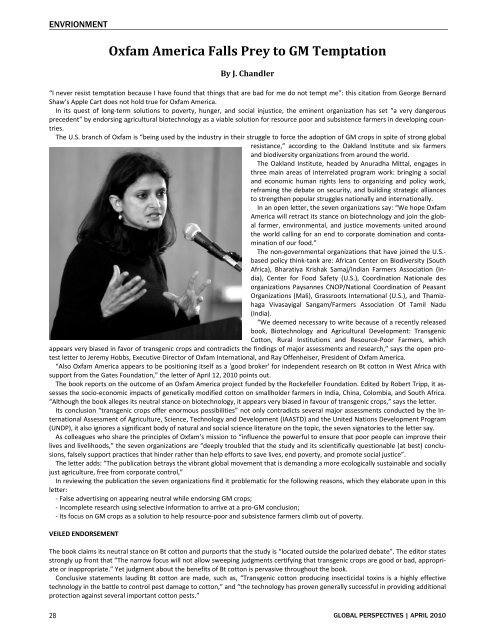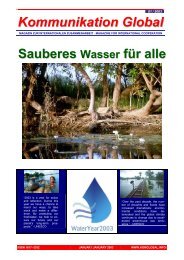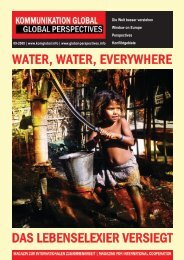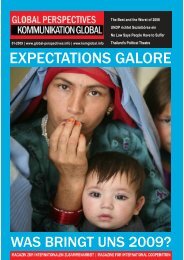ENVRIONMENTOxfam <strong>America</strong> Falls Prey to GM TemptationBy J. Chandler“I never resist temptation because I have found that things that are bad for me do not tempt me”: this citation from George BernardShaw’s Apple Cart does not hold true for Oxfam <strong>America</strong>.In its quest of long‐term solutions to poverty, hunger, and social injustice, the eminent organization has set “a very dangerousprecedent” by endorsing agricultural biotechnology as a viable solution for resource poor and subsistence farmers in developing countries.The U.S. branch of Oxfam is “being used by the industry in their struggle to force the adoption of GM crops in spite of strong globalresistance,” according to the Oakland Institute and six farmersand biodiversity organizations from around the world.The Oakland Institute, headed by Anuradha Mittal, engages inthree main areas of interrelated program work: bringing a socialand economic human rights lens to organizing and policy work,reframing the debate on security, and building strategic alliancesto strengthen popular struggles nationally and internationally.In an open letter, the seven organizations say: “We hope Oxfam<strong>America</strong> will retract its stance on biotechnology and join the globalfarmer, environmental, and justice movements united aroundthe world calling for an end to corporate domination and contaminationof our food.”The non‐governmental organizations that have joined the U.S.‐based policy think‐tank are: African Center on Biodiversity (SouthAfrica), Bharatiya Krishak Samaj/Indian Farmers Association (India),Center for Food Safety (U.S.), Coordination Nationale desorganizations Paysannes CNOP/National Coordination of PeasantOrganizations (Mali), Grassroots International (U.S.), and ThamizhagaVivasayigal Sangam/Farmers Association Of Tamil Nadu(India).“We deemed necessary to write because of a recently releasedbook, Biotechnology and Agricultural Development: TransgenicCotton, Rural Institutions and Resource‐Poor Farmers, whichappears very biased in favor of transgenic crops and contradicts the findings of major assessments and research,” says the open protestletter to Jeremy Hobbs, Executive Director of Oxfam International, and Ray Offenheiser, President of Oxfam <strong>America</strong>.“Also Oxfam <strong>America</strong> appears to be positioning itself as a 'good broker' for independent research on Bt cotton in West Africa withsupport from the Gates Foundation,” the letter of <strong>April</strong> 12, <strong>2010</strong> points out.The book reports on the outcome of an Oxfam <strong>America</strong> project funded by the Rockefeller Foundation. Edited by Robert Tripp, it assessesthe socio‐economic impacts of genetically modified cotton on smallholder farmers in India, China, Colombia, and South Africa.“Although the book alleges its neutral stance on biotechnology, it appears very biased in favour of transgenic crops,” says the letter.Its conclusion “transgenic crops offer enormous possibilities” not only contradicts several major assessments conducted by the InternationalAssessment of Agriculture, Science, Technology and Development (IAASTD) and the United Nations Development Program(UNDP), it also ignores a significant body of natural and social science literature on the topic, the seven signatories to the letter say.As colleagues who share the principles of Oxfam’s mission to “influence the powerful to ensure that poor people can improve theirlives and livelihoods,” the seven organizations are “deeply troubled that the study and its scientifically questionable (at best) conclusions,falsely support practices that hinder rather than help efforts to save lives, end poverty, and promote social justice”.The letter adds: “The publication betrays the vibrant global movement that is demanding a more ecologically sustainable and sociallyjust agriculture, free from corporate control,”In reviewing the publication the seven organizations find it problematic for the following reasons, which they elaborate upon in thisletter:‐ False advertising on appearing neutral while endorsing GM crops;‐ Incomplete research using selective information to arrive at a pro‐GM conclusion;‐ Its focus on GM crops as a solution to help resource‐poor and subsistence farmers climb out of poverty.VEILED ENDORSEMENTThe book claims its neutral stance on Bt cotton and purports that the study is “located outside the polarized debate”. The editor statesstrongly up front that “The narrow focus will not allow sweeping judgments certifying that transgenic crops are good or bad, appropriateor inappropriate.” Yet judgment about the benefits of Bt cotton is pervasive throughout the book.Conclusive statements lauding Bt cotton are made, such as, “Transgenic cotton producing insecticidal toxins is a highly effectivetechnology in the battle to control pest damage to cotton,” and “the technology has proven generally successful in providing additionalprotection against several important cotton pests.”28 <strong>GLOBAL</strong> <strong>PERSPECTIVES</strong> | APRIL <strong>2010</strong>
ENVIRONMENTEach chapter features sweeping claims, such as that providedfor the Chinese case study: “Bt cotton has made a significantcontribution to Chinese cotton production… the new technologyprovided effective pest control and allowed farmers to increasetheir productivity.”According to the book, in South Africa “research has clearlyshown that the Bt cotton technology works.” The authors concludethat in India “Bt hybrids contribute to cotton productivity.”Although the chapter on Colombia takes a more measured approachby positing that “it is not possible to attribute all of theproductivity gains of Bt growers to the transgenic technology butit would certainly appear that it has made a positive contributionto those who have been able to use it.”None of the above can be characterized as being neutral. Furthermore,review of a very limited volume of existing data on thetopic to draw its conclusions is not neutrality, but rather indicatesa clear bias, states the letter.SELECTIVE DATAThe book omits critical empirical data and analysis that wouldotherwise lead to a widely different conclusion about the allegedproductivity and success of Bt cotton. Also the findings withineach country case study are contradictory.The book cites the Makhathini Flats experience in South Africaas the model example which “has been hailed as proof that GMcrops can benefit smallholders in Africa.”Most informed observers know well that Makhathini Flats isconsidered a Potemkin village for the biotech industry whoselobbyists swoop down in delegations to visit a handful of carefullynurtured farmers with scripts extolling the wonders of Bt cotton.The book claims, “The majority of the literature has reportedimpressive adoption rates and positive economic returns.” Howthe authors arrived at such a sweeping claim of Bt cotton’s successis baffling.The study ignores significant scientific findings that arrive at asubstantially different outcome. According to a five‐year study offarmers in Makhathini Flats conducted by Biowatch South Africa,the majority of small‐scale farmers did not benefit from Bt cotton.In fact, in their drive to purchase Bt cottonseeds – which aredouble the price of conventional seed – farmers amassed onaverage $1,322 in debt. Of the 36 farmers studied, only fourmade a profit, whereas 80 percent defaulted on their loans.Another study published in 2006 in the academic journal Reviewof African Political Economy found that widespread adoptionof GM technology in the Makhatini Flats was the result oflimited choices for farmers. The adoption rate was high in thefirst years because farmers had no other option – one companyprovided both credit and seeds.Although Bt cotton was supposed to reduce farmers’ dependenceon pesticides, the study found that this was not the case dueto the emergence of secondary pests, like jassid.Ignoring these findings, the book based on Oxfam’s projectconcludes “Research has clearly shown that the Bt cotton technologyworks and that both large‐scale and smallholder farmerscan benefit.”The chapter on China cites a 2002 and 2004 study (Huang et al)that found that “farm‐level surveys in northern China show thatthe adoption of Bt cotton has raised cotton yields and allowedfarmers to reduce their insecticide use.”The authors, however, fail to include findings from a major2006 Cornell study jointly conducted with the Center for ChineseAgricultural Policy and Chinese Academy of Science. The team ofresearchers included Per Pinstrup‐Andersen, the 2001 Food PrizeLaureate and former Director General of IFPRI.The Cornell study found that seven years after the initial commercializationof Bt cotton in China, the profits enjoyed by Btcotton growers quickly diminished due to the emergence of secondarypests.Another finding was that Bt cotton farmers spent more on secondarypest control as their conventional counterparts: $16 perhectare for Bt growers, versus $5.70 per hectare for non Bt farmers.By 2004, Bt cotton growers earned 8 percent less than theircounterparts because GM seed cost triple the amount of conventionalseed. It is also worthy to note that even before adoption ofBt cotton, pesticide use among Chinese farmers was already quitehigh in China, which does not bode well for current rates.In the case of India, the study omits other findings that counterits conclusions. The authors write, “The introduction of Bt cottonhas coincided with increasing cotton yields and production in thepast few years.”Summary of the book states, “although Bt cotton contributes toyield increases, its original purpose was to lower the requirementsfor insecticide use…The Bt growers spray less frequentlythan the non‐Bt growers for bollworm… the Bt growers makesomewhat fewer total insecticide applications and use a considerablylower quantity of insecticides….”In the first week of March, biotech agriculture giant Monsantoadmitted to the Genetic Engineering Approval Committee (GEAC)of India, that field monitoring of the 2009 cotton season showedthat pink bollworm has developed resistance to its geneticallymodified (GM) cotton variety, Bollgard I, in Amreli, Bhavnagar,Junagarh and Rajkot districts in Gujarat.This admission verified 2004 findings of the scientists at theCentral Institute of Cotton Research in India who warned of therisk of pest resistance to Bt varieties in a paper published in theIndian Academy of Science publication. The authors established atheoretical model to predict resistance development in bollwormsdue to overuse of the cry1Ac gene.In a recent report submitted to Jairam Ramesh, India’s environmentminister before Monsanto’s admission, K.R. Kranthi ofthe Central Institute for Cotton Research had cautioned thatbollworms are developing resistance.The report also warned that not only has Bt cotton been renderedineffective, it has also led to detection of some new pestsnever before reported from India, which are causing significanteconomic losses.Two reputable Indian publications, The Hindu and India Today,recently established that cotton productivity dropped from 560kg lint per hectare in 2007 to 512 kg lint per hectare by 2009.While the Oxfam study found that “Bt growers make somewhatfewer total insecticide applications and use a considerably lowerquantity of insecticides,” the two Indian publications reported anincrease in pesticide expenditure by cotton farmers from Rs. 597crore in 2002 to Rs. 791 crore in 2009.The chapter on Colombian farmers’ experiences with GM cottonconcludes “it has made a positive contribution to those whohave been able to use it.” This conclusion, however, is not backedby the data presented by the authors.For one, if Bt cotton was so successful, then why did the percentageof land devoted to Bt cotton production drop from 70%in 2005 to 40 percent by 2009? The Oxfam study admits that GMseeds did not save “farmers significant investment in insecticides,”but claims that “the technology’s principal advantageappears to be its yield enhancement.” <strong>GLOBAL</strong> <strong>PERSPECTIVES</strong> | APRIL <strong>2010</strong> 29















